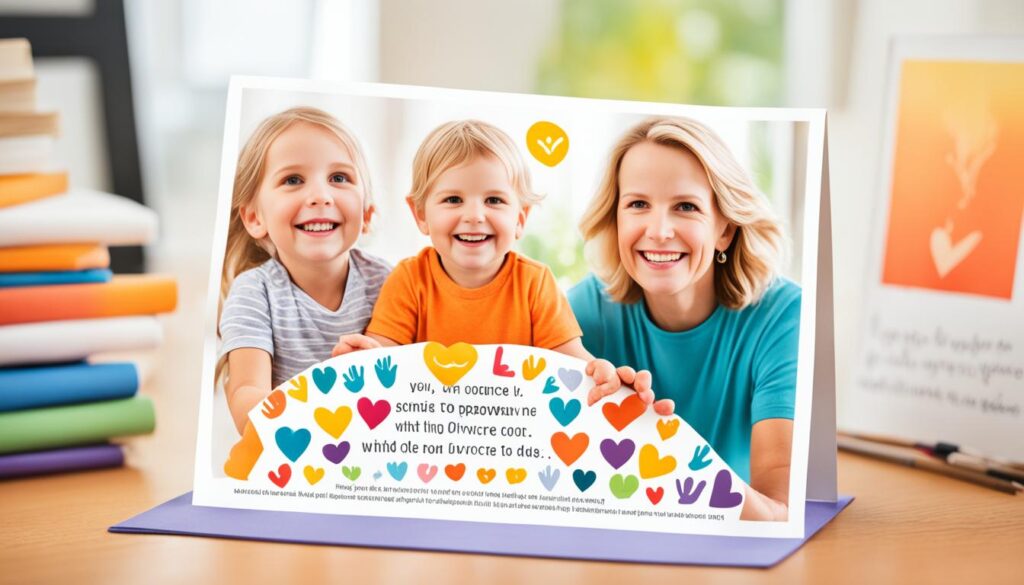Divorce can be a tough and emotionally taxing ordeal, particularly when children are in the picture. Nevertheless, it’s crucial for parents to prioritize keeping a positive attitude during this period. By adopting positive thinking and perspectives, divorced parents can establish a supportive and loving atmosphere for their children. In this post, we will delve into empowering advice and tips for divorcing parents aiming to cultivate positive thinking amidst life changes.
Key Takeaways:
- Divorce can be emotionally challenging, but maintaining a positive mindset is crucial for the well-being of both parents and children.
- Embracing personal growth and self-care can help divorced parents find a new sense of purpose and happiness.
- Letting go of resentment and bitterness is essential for creating a positive co-parenting relationship and moving forward in a healthier and happier way.
- Choosing the positive in co-parenting and prioritizing effective communication fosters a harmonious and supportive environment for children.
- Taking charge of your own happiness and nurturing healthy relationships are key to creating a positive future for both parents and children.
The Importance of Focusing on What’s Important to You
One of the positive aspects of divorce is the opportunity to focus on what truly matters to you. Divorced parents no longer have to compromise their values or sacrifice their time for the sake of a relationship. By letting go of resentment and bitterness, parents can determine the tone of the entire separation process and build a new life based on a deeper understanding of what is important to them. This mindset not only benefits the parents but also sets an example for their children on how to approach adversity with hope and courage.
Divorce can be a time of self-reflection and reassessment of priorities. By shifting the focus inward, divorced parents have the chance to rediscover their passions, explore new interests, and spend quality time with loved ones. This renewed sense of purpose and self-awareness paves the way for personal growth and fulfillment.
Divorced parents have the freedom to prioritize themselves and pursue what brings them genuine happiness and fulfillment.
By focusing on what’s important to them, divorced parents can create a life that aligns with their values and aspirations. This may involve exploring new hobbies, investing in personal development, or pursuing career opportunities that were previously put on hold. Through this process, divorced parents not only find their own happiness but also serve as role models for their children, showing them the importance of valuing one’s own well-being and pursuing their dreams.
The Power of Prioritizing Values
During a divorce, it’s common to feel overwhelmed by the emotions and challenging circumstances. However, by embracing a mindset that focuses on personal values, divorced parents can navigate this life transition with greater clarity and purpose. Taking the time to identify core values and aligning life choices with them helps create a strong foundation for moving forward.
For instance, if one of the core values is family, divorced parents can prioritize spending quality time with their children and developing meaningful connections. This may involve engaging in activities together, nurturing open communication, and creating a supportive and loving environment.
Letting Go of Resentment and Bitterness
It’s natural for feelings of resentment and bitterness to arise during and after a divorce. However, holding on to these negative emotions only hinders personal growth and happiness. By actively working on forgiveness and letting go of past grievances, divorced parents free themselves from the burden of negative energy and create space for new beginnings.
Letting go of resentment also fosters healthier co-parenting dynamics and improves communication between parents. When divorced parents can approach each other with empathy and understanding, it paves the way for cooperative decision-making and a more harmonious environment for their children.
The Role of Time in Focusing on What Matters
Time is a valuable resource, and after divorce, it becomes even more essential to prioritize how it is spent. Divorced parents have the opportunity to use their time more intentionally, focusing on activities and relationships that bring them joy and fulfillment.
By managing time effectively, divorced parents can strike a balance between work, personal pursuits, and quality time with their children. This not only helps foster stronger parent-child relationships but also enables parents to lead fulfilling lives outside of their parental roles.
The Path to Personal Happiness
Ultimately, the pursuit of personal happiness is a lifelong journey. After divorce, it becomes even more crucial for divorced parents to prioritize their happiness and well-being. This involves self-care, seeking support from loved ones and professionals, and taking active steps to cultivate positivity in their lives.
Image:
By focusing on what truly matters, divorced parents can embrace a future filled with happiness, fulfillment, and growth. When parents prioritize their own well-being, they become better equipped to create a positive and nurturing environment for their children, enabling them to thrive and flourish.
Embracing Personal Growth and Self-Care
Divorce provides an opportunity for parents to prioritize their own personal growth and well-being. After going through the emotional and often demanding process of divorce, it’s crucial for divorced parents to take time for themselves and engage in activities that promote self-care and personal development. By focusing on their own growth and happiness, they can ultimately create a positive environment for both themselves and their children.
One of the key aspects of personal growth after divorce is engaging in activities that bring joy and fulfillment. This can include pursuing hobbies or interests that may have been neglected during the marriage, reconnecting with old friends, or exploring new passions. By investing time and energy into activities that bring personal satisfaction, divorced parents not only nurture their own well-being but also set a positive example of self-discovery and resilience for their children.
Self-care is another vital component of personal growth after divorce. Taking care of both physical and mental health is essential for divorced parents to navigate the challenges and adjustments that come with the end of a marriage. This can involve implementing a regular exercise routine, practicing mindfulness or meditation, seeking therapy or counseling, or engaging in activities that promote relaxation and stress relief.
Quotes for Inspiration:
“Taking care of yourself is not a luxury, it’s a necessity. Remember, you can’t pour from an empty cup.”
“Invest in yourself. You deserve it. The better you are, the better you can be for your children.”
Benefits of Personal Growth and Self-Care:
Engaging in personal growth and self-care activities after divorce offers numerous benefits for both parents and their children. Firstly, it allows parents to heal and find their own sense of happiness and fulfillment, which ultimately positively impacts their ability to parent effectively. By taking care of their own well-being, divorced parents can demonstrate to their children the importance of self-care and resilience in the face of adversity.
Furthermore, prioritizing personal growth and self-care enables a parent to approach co-parenting from a place of strength and emotional stability. By filling their own cup, divorced parents have more energy, patience, and emotional availability to devote to their children. This contributes to a healthier and more harmonious co-parenting relationship, allowing the children to thrive in an environment of love, support, and stability.
Overall, embracing personal growth and self-care after divorce is a powerful step towards creating a brighter and more fulfilling future for both parents and their children. By investing in their own well-being, divorced parents can foster personal growth, resilience, and happiness, which sets the stage for a positive co-parenting dynamic and a thriving family unit.
Letting Go of Resentment and Bitterness
Divorce can often leave divorced parents feeling overwhelmed with resentment and bitterness towards their ex-spouse. These negative emotions can have a significant impact on both the parents and the children involved. Holding onto resentment and bitterness hinders the healing process and prevents the cultivation of a positive co-parenting relationship.
Forgiveness is a crucial step towards letting go of resentment. It’s not an easy process, and it may take time and effort to reach a place of forgiveness. However, forgiving your ex-spouse can have transformative effects on both your own well-being and the well-being of your children.
“Resentment is like taking poison and hoping the other person will die.”
– Nelson Mandela
Choosing to forgive allows you to release the negative emotions that weigh you down and frees you to move forward in a healthier and happier way. It enables you to focus on co-parenting effectively, putting the needs of your children above old grievances.
By letting go of resentment and bitterness, divorced parents can create a more harmonious co-parenting environment. This positive mindset allows for open communication, collaboration, and a focus on the well-being of the children.
“Bitterness is like cancer. It eats upon the host. But anger is like fire. It burns it all clean.”
– Maya Angelou
Forgiveness is a powerful tool that can help divorced parents break free from the emotional baggage of the past and pave the way for a healthier future. It doesn’t mean forgetting or condoning the actions that led to the divorce, but rather making a conscious choice to let go of the negative emotions that hold you back.
“True forgiveness is when you can say, ‘Thank you for that experience.’”
– Oprah Winfrey
Forgiving your ex-spouse and letting go of resentment and bitterness is a process that requires self-reflection, empathy, and a commitment to personal growth. It sets the stage for a more positive co-parenting relationship, allowing both parents to move forward with renewed focus, compassion, and the best interests of their children at heart.
| Benefits of Letting Go of Resentment and Bitterness | Effects of Holding Onto Resentment and Bitterness |
|---|---|
|
|

Choosing the Positive in Co-Parenting
Co-parenting can be a challenging yet essential aspect of divorce. It requires effective communication and a positive mindset to ensure a harmonious environment for the children involved. By choosing to focus on the positive aspects of the co-parenting relationship, divorced parents can create a supportive and nurturing atmosphere for their children to thrive in.
When conflicts arise, it’s crucial to respond with care and kindness, taking into consideration the well-being of the children. Instead of holding onto resentment or seeking revenge, divorced parents should prioritize open and respectful communication. By adopting a positive mindset and letting go of negative behaviors, they can pave the way for a healthier and more supportive co-parenting dynamic.
“Effective communication and a positive mindset are essential for successful co-parenting.”
A positive co-parenting approach not only benefits the children but also contributes to the overall well-being of both parents. It allows them to move forward with a sense of peace and happiness, knowing that they are providing the best possible environment for their children.
Remember, choosing the high road may be challenging at times, but it leads to greater happiness and well-being for everyone involved. By embracing positivity and prioritizing effective communication, divorced parents can navigate the complexities of co-parenting with grace and create a brighter future for their children.
Benefits of Choosing the Positive in Co-Parenting
- Fosters a healthier and more supportive environment for children
- Promotes open and respectful communication
- Reduces conflict and tension between divorced parents
- Facilitates positive role modeling for the children
- Enhances the overall well-being of both parents
Co-Parenting Success Story: Sarah and Michael
| Names | Divorce Process | Co-Parenting Approach | Outcome |
|---|---|---|---|
| Sarah | Amicable and cooperative | Positive mindset, effective communication | Healthy co-parenting relationship, thriving children |
| Michael | Collaborative and respectful | Focus on children’s well-being, shared decision-making | Positive co-parenting dynamic, personal growth |

By following in the footsteps of successful co-parents like Sarah and Michael, divorced parents can choose the positive path in co-parenting and create a nurturing environment for their children to thrive. Effective communication, a positive mindset, and a shared commitment to their children’s well-being are the cornerstones of a successful co-parenting relationship.
Taking Charge of Your Own Happiness
Happiness is a personal responsibility, and divorced parents have the power to take charge of their own happiness. By prioritizing self-care, seeking support from others, and engaging in activities that bring joy and fulfillment, divorced parents can cultivate a sense of happiness and well-being. This not only benefits the parents but also serves as a positive example for their children, showing them the importance of taking ownership of their own happiness.
The Power of Self-Care
Prioritizing self-care is crucial for divorced parents to maintain their happiness and well-being. Taking time for themselves allows them to recharge, reduce stress, and improve their overall mental and emotional health. Whether it’s through exercise, meditation, hobbies, or other self-care activities, divorced parents can find solace and create a positive impact on their well-being.
Seeking Support from Others
Divorced parents should not hesitate to reach out for support from friends, family, or support groups. Talking to others who have been through similar experiences can provide comfort, guidance, and perspective. By building a support network, divorced parents can share their challenges, celebrate successes, and receive the emotional support they need to navigate the complexities of divorce and co-parenting.
Engaging in Joyful Activities
Engaging in activities that bring joy and fulfillment is a powerful way for divorced parents to cultivate happiness. Whether it’s pursuing a passion, exploring new hobbies, or spending quality time with loved ones, these activities can provide a sense of fulfillment and purpose. By prioritizing these joyful activities, divorced parents can create positive energy and enhance their overall well-being.
“Happiness is not something ready-made. It comes from your own actions.” – Dalai Lama
Setting a Positive Example for Children
When divorced parents take charge of their own happiness, they show their children the importance of prioritizing their well-being and finding joy despite life’s challenges. By modeling a positive mindset and demonstrating resilience, divorced parents inspire their children to navigate difficulties with grace and optimism.

Nurturing Healthy Relationships
Divorce can be a challenging time, but it also opens the door to new possibilities and opportunities for growth. One of these opportunities is the chance to build new and healthy relationships. Divorced parents have the freedom to seek out partners who are more aligned with their long-term goals and values, creating the potential for lasting and fulfilling connections.
Nurturing these new relationships is crucial for divorced parents as they navigate the complexities of co-parenting. By cultivating healthy and positive connections with their new partners, divorced parents can create a supportive network that contributes to their overall happiness and well-being.
“Building healthy relationships after divorce is not only beneficial for the parents but also for their children,” says Dr. Emily Thompson, a licensed therapist specializing in family dynamics. “When parents are in healthy and supportive relationships, it can foster a sense of stability and security for the children, allowing them to thrive.”
When nurturing healthy relationships, communication and understanding are key. Divorced parents should openly discuss their expectations, goals, and values with their new partners. This allows for a deeper connection and a stronger foundation built on mutual respect and understanding.
Additionally, it’s important for divorced parents to foster a sense of teamwork within their new relationships. By working together as a cohesive unit, parents can provide a consistent and harmonious co-parenting environment for their children.
Co-Parenting with a New Partner
Co-parenting with a new partner requires patience, flexibility, and ongoing communication. Openly discussing parenting styles and expectations with the new partner ensures that everyone is on the same page when it comes to important decisions regarding the children.
It’s also essential for divorced parents to encourage a healthy relationship between their new partner and their ex-spouse. When all parties involved can maintain a respectful and cordial relationship, it creates a positive co-parenting dynamic that benefits everyone.
Role Modeling Healthy Relationships
By nurturing healthy relationships after divorce, parents have the opportunity to role model healthy relationship behaviors for their children. This includes demonstrating effective conflict resolution, effective communication, and mutual respect within their new partnerships.
“When children see their parents engaged in healthy relationships, they learn valuable lessons about what it means to be in a successful partnership,” explains Dr. Thompson. “This sets the stage for their own future relationships and helps them navigate challenges with resilience and maturity.”

No matter the circumstances, divorce can be a catalyst for positive change and personal growth. By nurturing healthy relationships, divorced parents not only enhance their own happiness and well-being but also create a supportive environment that allows their children to thrive.
The Impact on Children
Divorce can have a significant impact on children, and it’s crucial for divorced parents to prioritize their children’s well-being during this challenging time. By approaching the divorce with a positive mindset and demonstrating resilience, divorced parents can play a pivotal role in shaping their children’s future.
Children are incredibly perceptive and impressionable, which means they observe and learn from their parents’ actions and attitudes. By modeling resilience and hope in the face of adversity, divorced parents can teach their children valuable life skills.
Resilience is the ability to bounce back from difficult situations and adapt to change. It’s an essential skill that children need to navigate life’s challenges, not just in the context of divorce, but in various aspects of their lives.
Role Modeling Resilience
Divorced parents have the opportunity to demonstrate resilience to their children by handling the divorce process with grace, dignity, and optimism. This means keeping communication civil, resolving conflicts amicably, and focusing on the well-being of the children above all else.
“Children observe and internalize how their parents handle adversity. By demonstrating resilience during divorce, parents can teach their children valuable skills for overcoming challenges in their own lives.”
When children witness their parents navigating divorce with resilience, it can instill a sense of hope and courage within them. They learn that setbacks and difficult circumstances don’t have to define their future. Instead, they can rise above challenges, embrace change, and create a positive future for themselves.
Establishing Healthy Coping Mechanisms
Divorce often brings a wave of emotions for both parents and children. It’s important for divorced parents to establish healthy coping mechanisms to manage their own emotions and support their children during this time of transition.
By addressing their emotions in a healthy way, such as through therapy, exercise, or journaling, divorced parents can teach their children the importance of self-care and emotional well-being. This helps children develop their own coping strategies, fostering resilience and emotional intelligence.
Creating a Supportive Environment
Divorced parents can also make a significant impact on their children by creating a supportive environment. This involves fostering open and honest communication, actively listening to their children’s concerns, and providing reassurance and stability in the midst of change.
To further support their children, divorced parents can collaborate on co-parenting responsibilities, ensuring consistency and structure across both households. This consistency helps children feel secure and reinforces their resilience in adapting to their new family dynamic.
Lessons in Resilience for Children
| Resilience Lesson | Explanation |
|---|---|
| Adapting to Change | Children learn that change is a natural part of life and can bring new opportunities for growth. |
| Positive Problem-Solving | Children observe their parents finding solutions to challenges with a positive mindset, encouraging them to approach problems with optimism. |
| Emotional Regulation | Through their parents’ example, children learn healthy ways to manage and express their emotions, fostering emotional well-being. |
| Respecting Differences | Divorced parents who model respect and cooperation despite differences teach their children the value of acceptance and empathy. |

The Power of Cooperation in Co-Parenting
Co-parenting requires cooperation and effective communication between divorced parents. By working together and setting aside differences, divorced parents can create a harmonious and stable environment for their children. This involves open and respectful communication, flexibility, and a commitment to putting the children’s needs first. When parents can co-parent in a cooperative manner, it fosters a positive and supportive relationship for everyone involved.
Divorce can be a challenging time for both parents and children. However, by prioritizing cooperation in co-parenting, divorced parents can minimize conflict and create a nurturing environment that promotes the well-being of their children.
- Open and respectful communication: Divorced parents should strive to maintain open lines of communication and foster a respectful dialogue. This involves active listening, being considerate of each other’s perspectives, and avoiding confrontational or combative language.
- Flexibility: It’s important for divorced parents to be flexible and understanding when it comes to accommodating each other’s schedules and commitments. This can include making adjustments to visitation arrangements or sharing unexpected responsibilities when necessary.
- Putting the children’s needs first: Co-parents should always prioritize the best interests of their children. This means making decisions that promote their emotional and physical well-being, even if it requires compromise or sacrifice.
By adopting a cooperative approach to co-parenting, divorced parents can create a stable and supportive environment where their children feel secure and loved. This not only benefits the children but also helps to maintain a positive relationship between the parents.
“Co-parenting requires teamwork and a commitment to communication. By working together, divorced parents can provide a sense of stability and consistency for their children.” – Anonymous
Divorce can be a difficult journey, but with cooperation and effective communication, divorced parents can navigate the challenges of co-parenting and create a positive and nurturing environment for their children.
| Benefits of Cooperation in Co-Parenting | Benefits of Lack of Cooperation in Co-Parenting |
|---|---|
| Enhanced emotional well-being for children | Increased stress and anxiety for children |
| Positive role modeling for conflict resolution | Negative role modeling for conflict resolution |
| Reduced conflict and tension between parents | High levels of conflict and tension between parents |
| Enhanced co-parenting relationship | Strained and contentious co-parenting relationship |
When divorced parents prioritize cooperation and effective communication, they create a foundation for successful co-parenting. By putting their children’s needs first and working together, they can navigate the complexities of divorce and build a supportive co-parenting relationship that promotes the well-being of their children.

Embracing Change and Moving Forward
Divorce brings about significant changes in life, but it also provides an opportunity for personal growth and new beginnings. By embracing change and focusing on personal growth, divorced parents can create a positive future for themselves and their children.
“Change is inevitable, but growth is optional.”
Letting go of the past is an essential step towards moving forward. Dwelling on the past can hinder personal development and prevent divorced parents from fully embracing new possibilities. It’s important to remember that the end of a marriage does not signify the end of life itself. By acknowledging the changes that have taken place and choosing to see them as opportunities for growth, divorced parents can embark on a journey of self-discovery and transformation.
Cultivating a mindset of resilience and adaptability is crucial in navigating the challenges that come with divorce. It’s natural to experience a wide range of emotions during this time, but by developing a resilient mindset, divorced parents can bounce back stronger and adapt to their new circumstances. This resilience not only benefits their own well-being but also serves as a powerful example for their children, showcasing the strength and determination needed to face life’s adversities.
The Path to Personal Growth
Personal growth is a continuous process that requires effort and self-reflection. Here are some steps divorced parents can take to embrace change and foster personal growth:
- Engage in self-reflection: Take the time to understand your own desires, values, and aspirations. Reflect on what changes you want to make in your life and how you want to grow as an individual.
- Set goals: Establish realistic goals that align with your personal vision for the future. These goals can be related to various aspects of your life, such as career, relationships, and personal well-being.
- Seek support: Surround yourself with a supportive network of family, friends, or professionals who can provide guidance and encouragement along your journey of personal growth.
- Embrace new experiences: Step out of your comfort zone and embrace new experiences and opportunities. Trying new things can broaden your perspective and help you discover hidden strengths and passions.
- Practice self-care: Prioritize self-care activities that promote physical, mental, and emotional well-being. This may include activities such as exercise, mindfulness, journaling, or pursuing hobbies that bring you joy and fulfillment.
By actively engaging in personal growth, divorced parents can move forward with confidence, create a positive future, and inspire their children to do the same.

| Benefits of Embracing Change and Moving Forward | Actions to Foster Personal Growth |
|---|---|
| 1. Discovering new opportunities for happiness and fulfillment. | 1. Engage in self-reflection. |
| 2. Cultivating resilience and adaptability. | 2. Set goals. |
| 3. Inspiring children to embrace change and grow. | 3. Seek support. |
| 4. Creating a positive future for both parents and children. | 4. Embrace new experiences. |
| 5. Practice self-care. |
Co-Parenting Quotes for Inspiration
To provide further inspiration and motivation for divorced parents, here are some powerful co-parenting quotes that highlight the importance of maintaining a positive mindset and focusing on the well-being of the children. These quotes serve as a reminder of the positive impact that divorced parents can have on their children’s lives and the importance of putting their happiness and well-being first.
“Co-parenting is not about your feelings towards each other, but your commitment to your children’s happiness and well-being.” – Unknown
“Divorce may end a marriage, but it doesn’t end a family. Co-parenting keeps the love and connection alive for the sake of our children.” – Unknown
“In the midst of divorce, remember the love you once had for your children, and let that guide your co-parenting journey.” – Unknown
“Co-parenting requires putting your differences aside and focusing on your children’s future. They deserve nothing less.” – Unknown
“Your children didn’t choose divorce, but they can choose happiness. Your co-parenting journey plays a crucial role in shaping their path.” – Unknown
“Co-parenting is a constant reminder that love for our children exceeds our differences. It’s a beautiful testament to the power of unconditional love.” – Unknown

Conclusion
Divorce can be a challenging journey for parents, but by approaching it with a positive mindset and prioritizing the well-being of both themselves and their children, a positive and supportive environment can be created. Throughout the process, divorced parents should focus on what’s important to them, embrace personal growth, let go of resentment, choose positivity in co-parenting, take charge of their own happiness, nurture healthy relationships, and embrace change. These steps, combined with dedication, communication, and cooperation, empower divorced parents to navigate the challenges of co-parenting and provide a bright and hopeful future for their children.
By maintaining open lines of communication, showing flexibility, and putting the needs of the children first, divorced parents can foster a harmonious co-parenting relationship. This not only sets a positive example for their children but also ensures their well-being and emotional development. Moreover, prioritizing self-care, seeking support, and engaging in activities that bring joy and fulfillment contribute to the overall happiness and well-being of divorced parents.
Divorce can be an opportunity for personal growth and new beginnings. It allows parents to redefine their priorities, build new relationships that align with their values, and create a fulfilling life for themselves and their children. By embracing change and exhibiting resilience and adaptability, divorced parents can demonstrate to their children that adversity can be overcome with hope and courage. The journey of co-parenting may come with its challenges, but with positivity, dedication, and a focus on the well-being of all involved, divorced parents can create a nurturing and supportive environment that enables their children to thrive.
FAQ
How can divorced parents maintain a positive mindset during the divorce process?
Divorced parents can maintain a positive mindset by focusing on what truly matters to them and embracing their values and priorities. Letting go of resentment and bitterness is also important in setting a positive tone for the separation process.
What are some ways divorced parents can prioritize their personal growth and well-being?
Divorced parents can prioritize their personal growth and well-being by engaging in activities that bring them joy and fulfillment, such as pursuing hobbies, reconnecting with old friends, and taking care of their physical and mental health.
How can divorced parents let go of resentment and bitterness towards their ex-spouse?
Letting go of resentment and bitterness takes time, but it is crucial for creating a positive co-parenting relationship. Divorced parents can work towards forgiveness and focus on moving forward in a healthier and happier way.
How can divorced parents choose a positive mindset in co-parenting?
Divorced parents can choose a positive mindset in co-parenting by focusing on the positive aspects of the relationship, responding to conflict with care and kindness, prioritizing the well-being of the children, and avoiding revenge or negative behavior.
How can divorced parents take charge of their own happiness?
Divorced parents can take charge of their own happiness by prioritizing self-care, seeking support from others, and engaging in activities that bring them joy and fulfillment.
Is it possible for divorced parents to nurture healthy relationships after divorce?
Yes, divorce provides an opportunity for divorced parents to seek and find new partners who are more aligned with their long-term goals and values. Nurturing these healthy relationships is important for the overall happiness and well-being of both the parents and children.
How can divorce impact children and what can divorced parents do to help them?
Divorce can have a significant impact on children. Divorced parents can help by approaching the divorce with a positive mindset, demonstrating resilience, and teaching valuable lessons about how to approach adversity with hope and courage.
What is the importance of cooperation in co-parenting?
Cooperation is crucial in co-parenting. Divorced parents can create a harmonious and stable environment for their children by working together, setting aside differences, and prioritizing the needs of the children.
How can divorced parents embrace change and move forward after divorce?
Divorced parents can embrace change and move forward by letting go of the past, embracing new possibilities, and cultivating a mindset of resilience and adaptability.
Can Positive Thoughts and Uplifting Advice Help During the Divorce Process in Maryland?
Going through a Maryland divorce can be emotionally draining, but maintaining positive thoughts and seeking uplifting advice can make the process more manageable. Taking steps for Maryland divorce, such as practicing self-care and seeking support from loved ones, can help individuals navigate this challenging time with more ease.










